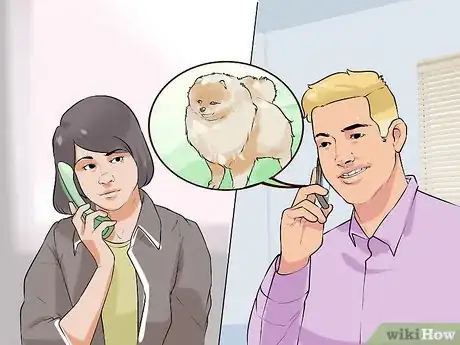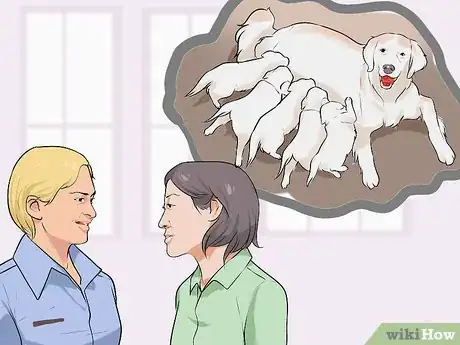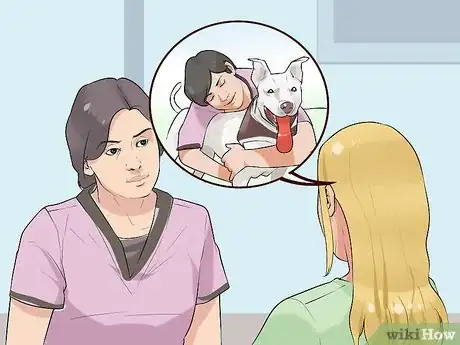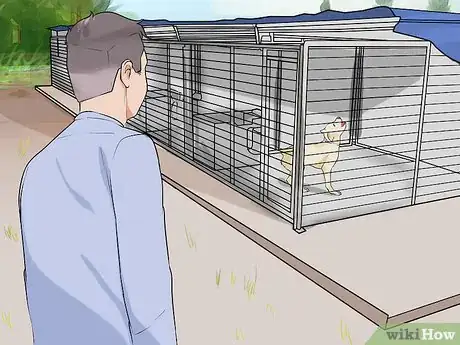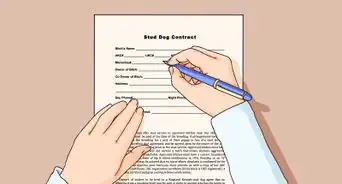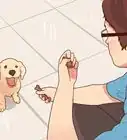This article was co-authored by Jeannie McElroy. Jeannie McElroy is a Canine Enthusiast & Breeder of Champion European Boxers under the kennel name Big Mac Boxers. With over 25 years of experience, she specializes in training, working, showing, and titling her dogs in many different types of ring sports. Jeannie is an AKC Evaluator and titles therapy dogs for Therapy Pets Unlimited. She is also a member of the AKC Bred with Heart, Greater Cincinnati Boxer Club, and US-BOX Working Boxer Association. She is passionate about the breed as she adores rearing the next generation through selectively breeding only health-tested dogs from pedigrees known to have quality genetics.
There are 8 references cited in this article, which can be found at the bottom of the page.
This article has been viewed 37,967 times.
If you’ve decided to purchase a purebred dog, you will need to reach out to a professional dog breeder. To start this process, you will first want to get the contact information for a few potential breeders. Then, send them a quick email or make a phone call in which you introduce yourself and explain your interests in dog ownership. Ask them multiple questions about their breeding philosophy. And, try to visit their facility, if at all possible, prior to finalizing your purchase.
Steps
Choosing a Breeder to Contact
-
1Decide on a particular breed of dog. Before you reach out to a breeder, you will want to choose a particular breed of dog to purchase. A reputable breeder will only raise one particular type of breed of dog, so identifying your preferences will automatically narrow down your contact choices.[1]
- You can identify a breed that is a good fit for you by looking at the traits of the group. For example, take into account the breed’s fitness level as well as their particular grooming needs.
-
2Discuss the process with your vet. Ask them if there is a particular breed that they would recommend for you. And, see if they have any recommendations regarding local breeders. Most good breeders will have a strong working relationship with a local vet, in order for their dogs to receive the best of care. This is a great way to find out about those breeders who don’t advertise their services, but do a good job.[2]
- You might ask, “Do you provide care for any breeders in the area? What type of dogs do they breed and would you recommend them to me?”
Advertisement -
3Get a kennel club reference. Your local dog club likely keeps a detailed list of breeders operating in their area. Get ahold of your local group by going to the American Kennel Club (AKC website) and searching for the chapter directory. The national AKC can also put you into contact with a breeder referral expert who will assess your needs a provide you with al list of vetted breeders.[3]
- You can also search for a breeder using the AKC National Puppy Finder registry, located on their main website. This is a system that allows you to find breeder names by entering in your selection criteria, including breed type.
-
4Consider adopting or rescuing a dog. Owning a purebred dog is great and you can often find these types of dogs in shelters as well. It make take a bit of time and you may need to get an older dog, but adopting can be well worth the effort. You should also consider a mixed breed dog if you are not interested in dog competitions. Mixed breeds are often considered more healthy than their pure counterparts.[4]
- The AKC actually has a paperwork process that you can follow if you’d like to register an adopted dog as a purebred one for competitive or breeding purposes. Look at the AKC website for additional details.
- To find a local shelter in your area, you can go to the Petfinder website. Or, you can enter your city name and “animal adoption” into a search engine.
Talking with a Breeder on the Phone
-
1Get ahold of them via phone or email. Once you’ve got a breeder’s contact information, reach out to them as soon as you can. It may take a few attempts to finally establish contact as breeders are known for being extraordinarily busy and they spend a great deal of time outdoors. If you call, just leave a message with all of your contact details.[5]
- If you leave a message, it is a good idea to tell the breeder how you found out about them. They may be more likely to call you back quickly if you found them via a professional contact, such as a vet.
- In your opening statements, you may also want to make it clear that you are not interested in just any purebred dog, but that you are looking for one that meets particular requirements regarding lineage and care. You might say, “I’m trying to find a Pomeranian breeder who manages the breeding process from start to finish.”
-
2Inquire about the breeder’s experience. After you’ve passed the introductory phase, you should head into a conversation about the breeder’s background and professional credentials. Ask if they belong to any dog organizations. Verify that they have a breed specialty and ask how long they’ve been in business.[6]
- It is also a good idea to ask how long they’ve been in business at the same location. Some bad breeders move their operations multiple times in order to cover up animal cruelty investigations or simply bad reputations.
- You can also ask a breeder why they choose to breed dogs instead of simply owning them. Many breeders will express their passion for the breed and their desire to participate in the upkeep of pure bloodlines.
-
3Ask about their breeding process. A good breeder will raise only a handful of litters a year, in order to give their full attention to each puppy. Ask them how many successful placements they’ve made and how they determine the mating pairings. Ask how many puppy they’ve had returned as well for health or behavioral issues.
- Ask if the litter has been handled by children or exposed to normal household noises as well.
- Feel free to ask specific questions about what they're feeding their dogs, too. Do they use a reputable dog food brand? Do they give their dogs pre-natal vitamins?
-
4Get them to tell you all about the breed. A good breeder should be in love with that particular breed of dog and more than willing to tell you anything and everything about its characteristics. You can inquire about the type of grooming care that the breed needs or perhaps even what type of food they would recommend. If you have a family, you might discuss how well the breed does interacting with a number of people in a home setting.[7]
-
5Discuss the particular litter or puppy. You are buying the breed, but you are also buying a single puppy with a unique personality. Talk with the breeder about whether or not they raise the puppies in-house or purchase them elsewhere. The best breeders do everything themselves. In your conversation, the breeder will likely mention a particular litter that they think will fit your needs.[8]
- If the breeder offers to place you on a waitlist pending the next litter, this is a good thing. It means that your breeder is in demand, but not overbreeding. Agree to be placed on the list, but ask for a time estimate.[9]
- Most dog breeders will allow you to take home your puppy when it is between 8-12 weeks old. This allows time for socialization.[10]
- Some breeders do aptitude testing for their puppies that sheds some light on their personalities.
-
6Go over any health certifications. Good dog breeders will always offer specific documentation showing that the puppy you’ll adopt is healthy both in a general sense and genetically. The documentation will be breed-specific and from a regulatory agency, such as the Orthopedic Foundation for Animals.[11]
- See if the dogs were health-tested by a board-certified cardiologist, too.
-
7Request at least three references. Your puppy purchase is an investment with long-term consequences and, as such, you should ask the breeder to provide a set of personal and professional references. They may put you into contact with their vet, prior buyers, or even fellow breeders. Make sure to contact these people asap as you go through the buying process.[12]
- It's always a good idea to contact the breeder's veterinarian while you're doing research.
-
8Pass through an interview process. Just as you are curious about them, you should expect that the breeder will want to know a great deal about you. They will likely inquire about your home environment. They may ask about your lifestyle and whether or not you have the time to devote to dog care. Be as honest as you can and give detailed answers to move the process along.[13]
Meeting with a Breeder in Person
-
1Request at least one visit to their kennel. You may be lucky and find a local breeder. But, even if your breeder lives a distance away, you should personally visit their facility at least one time, preferably more. Good breeders will welcome this opportunity and will work with you to set arrangements shortly after your first conversation.[14]
- Keep your travel costs and your schedule in mind when you first contact the breeder. You want to be able to make a quick decision if they offer you a visit.
- Some breeders welcome family visits as well. If you are adopting the puppy into a family, this is an important moment to see how the puppy, and breed in general, interacts with your child or partner.
-
2Pay attention to the status of the facility. From the moment you arrive, try to observe as much as you can about your surroundings. Pay particular attention to the boarding facility itself. Note the cleanliness of the lodgings and their appearance overall. Look to see if there is room for the dogs to play and comfortable areas for them to sleep.[15]
- No kennel is spotless. A little dirt is to be expected. However, the presence of general refuse, trash, or feces are not signs of a good facility. Check the cleanliness of the food and water bowls.[16]
-
3Pay attention to the status of the dogs. You should be given the opportunity to see the dogs in general, and your potential puppy more specifically. Try to play with the dogs to see how they interact. Look at their overall appearance to get an idea of their health. Do they appear well socialized? Do you see weeping eyes (a sign of sickness)?[17]
Warnings
- Don’t sign any contracts without carefully reading all of the details.⧼thumbs_response⧽
- If you get any indication that the breeder is abusive to animals, contact law enforcement immediately and request assistance.⧼thumbs_response⧽
References
- ↑ http://www.caninejournal.com/picking-the-right-dog-breed/
- ↑ http://www.cbsnews.com/news/how-to-tell-a-good-dog-breeder/
- ↑ https://www.apps.akc.org/apps/contact/answer_center/faq_findabreeder.cfm
- ↑ http://www.humanesociety.org/issues/puppy_mills/tips/finding_responsible_dog_breeder.html
- ↑ http://www.akc.org/press-center/facts-stats/responsible-breeders/
- ↑ http://www.wihumane.org/advocacy/breeder-information/reputable-breeder-information
- ↑ http://www.cbsnews.com/news/how-to-tell-a-good-dog-breeder/
- ↑ http://www.humanesociety.org/assets/pdfs/pets/puppy_mills/find_responsible_dog_breeder.pdf
- ↑ http://dogtime.com/puppies/5-finding-a-good-breeder#DvM0Bpb8TGHjbozG.99
- ↑ http://www.akc.org/press-center/facts-stats/responsible-breeders/
- ↑ http://www.humanesociety.org/assets/pdfs/pets/puppy_mills/find_responsible_dog_breeder.pdf
- ↑ http://www.humanesociety.org/assets/pdfs/pets/puppy_mills/find_responsible_dog_breeder.pdf
- ↑ http://www.humanesociety.org/assets/pdfs/pets/puppy_mills/find_responsible_dog_breeder.pdf
- ↑ http://www.humanesociety.org/issues/puppy_mills/tips/finding_responsible_dog_breeder.html
- ↑ http://www.humanesociety.org/assets/pdfs/pets/puppy_mills/find_responsible_dog_breeder.pdf
- ↑ http://dogtime.com/puppies/5-finding-a-good-breeder#DvM0Bpb8TGHjbozG.99
- ↑ http://www.akc.org/press-center/facts-stats/responsible-breeders/
About This Article
To contact a dog breeder, try asking for recommendations from your vet or your local kennel club. When you contact the breeder, ask them about their professional credentials and how long they've been in the business. Then, ask how many successful placements they’ve made so you know they’re reliable. You should also check they only rear a few litters every year, which shows they take time to care for all of the puppies. Additionally, ask for 3 customer references, and visit their kennels at least once before agreeing to buy a puppy. For tips on what to look out for when you visit a breeder’s kennel, read on!




